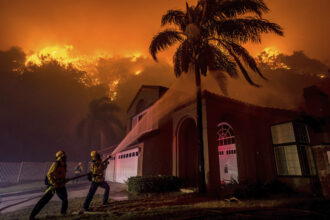We’ve all heard the horror stories of Black Friday.
Fueled by the promise of discounted merchandise, the Friday after Thanksgiving remains one of the busiest shopping days of the year, with online sales this Black Friday hitting a new world record of $9.12 billion. The consumer-frenzied tradition—whose nickname comes from the economic phrase “in the black,” signaling a company has become profitable—also has a reputation for bringing out the worst in people.
Stuck in massive lines and competing over limited products, customers who participate in Black Friday sales have been known to camp out overnight in front of stores and even get into physical fights over products. In 2019, one fight caught on video shows two Marines exchanging blows in a Walmart in California, resulting in at least one broken nose.
But a growing number of retailers, including some major international brands, are opting out of offering Black Friday discounts, pointing not only to the annual tradition’s tendency to spur ugly customer behavior, but also to its “enormous environmental impact.” Other businesses are offering alternative takes on the Friday shopping holiday aimed at promoting a more circular economy, where products are used for longer before being recycled back into the marketplace in some way rather than simply becoming trash.
Because manufacturing and transportation still rely overwhelmingly on the burning of fossil fuels, the production and delivery of consumer goods make up the majority of the world’s annual greenhouse gas emissions. One 2015 study concluded that household goods and services were responsible for 60 percent of global emissions. Consumer goods, and especially their plastic packaging, are also the primary source of physical waste.
Companies then amplify those already disproportionate environmental impacts over the Black Friday weekend, critics of the tradition say, by offering bulk discounts that encourage wasteful and excessive consumption—often of cheaply-made products that aren’t intended to last and are either returned to the sellers or thrown away sometimes after just one use.
“Black Friday is an extremely worrying trend,” Phil Purnell, a civil engineering professor at the University of Leeds who researches the environmental consequences of Black Friday sales, told the German news broadcaster Deutsche Welle. “The consumption of all of that material has an enormous environmental impact, not just in terms of the pollution that’s created during mining and the depletion of natural resources to create the things you buy, but also in terms of carbon from transportation.”
In 2019, Purnell co-authored a study that found that up to 80 percent of the items purchased through Black Friday sales, including the plastic packaging they’re wrapped in, very quickly end up in landfills or are burned in incinerators. At best, the report said, products go to “low quality recycling” facilities after “a very short life.”
A separate report, published last year, also found that deliveries for Black Friday sales made online in 2021 were responsible for an estimated 386,243 metric tons of carbon emissions in the United Kingdom alone. That’s equivalent to the emissions released by more than 215 flights taken between London and Sydney in just 24 hours, the report’s authors said.
In response to those environmental impacts, some major companies, including outdoor apparel giant REI and popular beauty brand Deciem, have begun closing their stores and halting all website sales on Black Friday to encourage more sustainable consumer and business habits. For REI, which closed its stores the day after Thanksgiving for the seventh year in a row and is widely credited for spearheading the movement against Black Friday, the day has also become a paid holiday for employees, who are encouraged to spend that time outside in nature.
In Europe, clothing retailer Xandres and home and garden chain Dille & Kamille also closed their stores and halted website sales this year for Black Friday. Xandres took the move a step further and also offered to repair any old clothes bought from their stores for free so long as customers brought it to their headquarters in Ghent, Belgium, by Friday.
“The idea behind Black Friday is to buy as much clothing as possible at the biggest discount possible. That does not match our sustainability philosophy,” Xandres CEO Patrick Desrumaux told Reuters. “You cannot buy anything at all from us today. All our shops are closed, the webshop is closed and instead of selling, we are going to grant a longer life to clothes by repairing all the clothes that were brought in.”
Desrumaux isn’t alone in that sentiment, and, in fact, a growing chorus of sustainability advocates see the burgeoning fast fashion industry as a major problem for the environment. The global apparel industry is responsible for roughly a third of the world’s microplastic waste, as well as 4-8 percent of all human-made greenhouse gas emissions worldwide. Critics also accuse popular fast fashion brands, such as China-based Shein, of preying on younger generations and promoting a “throwaway culture” by offering clothes so cheaply that they’re often worn only once before being discarded. Shein, for example, offers between 700 and 1,000 new styles every single day with price tags that rarely exceed $20—not just during shopping holidays like Black Friday.
Other companies, including clothing retailers Patagonia and Everlane, as well as furniture chain Ikea, didn’t pause their Black Friday sales, but offered alternative takes to the shopping holiday to promote more sustainable practices or support environmental causes—a trend many companies are now referring to as “Green Friday.” Both Everlane and Patagonia, for example, donate their Black Friday profits to organizations fighting climate change. And Ikea offers a Black Friday discount to customers only if they bring in used furniture as part of its recycling program it started last year.
But activists have criticized many of those efforts as overstating their environmental benefits, warning consumers to be wary of greenwashing when it comes to companies claiming to be against Black Friday and the environmentally harmful consumer culture the tradition promotes.
Hong Kong-based Cathay Pacific Airways, for example, offered as part of its Green Friday deal this year to match the carbon offsets customers purchased with their plane tickets for the day, theoretically doubling the carbon emissions reduced for each trip. But climate experts have long criticized the lack of oversight and questionable benefits promised by proponents of carbon markets, which allow companies to essentially pay others to offset their carbon emissions rather than the company reducing its own emissions.
“Companies linking offsets to promotional deals may reinforce the false impression among consumers that their emissions don’t need to be reduced and can simply be compensated through offsets,” Rob Macquarie, policy analyst at the Grantham Research Institute, a climate change think tank, told The New Statesman.
Libby Peake, head of resource policy for the Green Alliance, another environmental think tank, put it in simpler terms: “The key is to buy less and buy better.”
Thanks for reading Today’s Climate. I’ll be back in your inbox on Friday—but before you go:
Hot Gossip
Before the holiday break last week, I wrote about the increasingly bizarre and confrontational climate demonstrations this year that have sparked heated public debate over what’s an appropriate way to protest. Activists have broadly argued that they’re highlighting the lack of urgency from world leaders and general global failure to address the climate crisis.
But last week, on Thanksgiving, climate activists took that boldness to a new level when they cut through the wire fence surrounding the Berlin International Airport, casually strolled onto the tarmac and glued themselves to a runway before placing an emergency call to the police to inform them of what they had done. The publicity stunt, which arguably exceeded the boldness of past demonstrations by an order of magnitude, raised immediate questions from public officials over safety and security concerns.
While the controversy of the protests have mostly involved demonstrators throwing food at famous works of art, some critics of the recent protests said this incident clearly went too far and potentially put both the lives of the protesters and passengers on incoming flights in danger. It even prompted one Forbes contributor to ask: When does a climate protest become terrorism?
We want to know what you think. Did the protesters go too far? Does the climate crisis, and the lack of urgency surrounding addressing it, justify even bolder acts? Reach out to us and let us know.
Today’s Indicator
5.1
That’s approximately how many Earths would be needed if every person on the planet consumed as many resources as the average American, according to u003ca href=u0022https://www.overshootday.org/how-many-earths-or-countries-do-we-need/u0022u003eresearch from the Global Footprint Networku003c/au003e.
Top News from Our Warming World
Greta Thunberg Sues Her Native Sweden for Failing on Climate – Bloomberg
What Happened to Autumn? Scientists Point to Climate Change – Yahoo News
Less Attractive, Less Picky: How mating is changing in a hotter world – The Washington Post



















